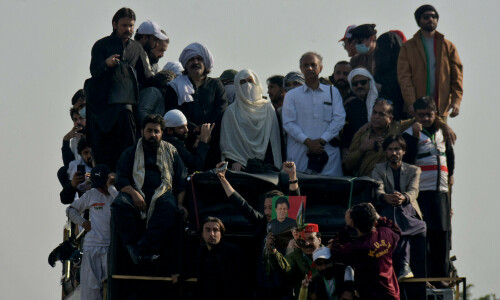PESHAWAR, July 20: Governor of the North-West Frontier Province has said that statements by American officials and politicians about possible military action in tribal areas of Pakistan are undermining the PPP-led coalition government.
Governor Owais Ghani said any incursion into Pakistan’s mountainous north-western tri-bal belt bordering Afghanistan would spark “disastrous” consequences for the whole world.
He singled out White House hopeful Barack Obama as issuing particularly damaging statements. “Candidate Obama gave these statements, I come out openly and say such statements undermine support, don’t do it,” Ghani told AFP in an interview in his official residence in Peshawar.
A spate of US missile strikes in Pakistan on Al Qaeda and Taliban hideouts in the tribal areas had also inflamed public sentiment against Islamabad’s role in the US-led “war on terror,” said Ghani, who oversees anti-militancy policies in NWFP and the adjoining Federally Administered Tribal Areas.
The strikes added to the economic and political woes facing the parties that beat allies of US-backed President Pervez Musharraf in elections in February.
“I think they are being short-sighted and they are being unrealistic,” said Ghani, a key Musharraf lieutenant, referring to Obama and other US officials.
“What the allies and the world must understand is that no government, whether political or military, can remain involved in this global war on terrorism unless the majority of public sentiment backs it,” he said.
“These strikes are undermining that, but even the statements are, too.”
Pakistan’s government has been under international pressure since launching peace negotiations with Taliban commanders in March.
US President George W. Bush said last week he would discuss the cross-border movement of extremists with Pakistan’s Prime Minister Yousuf Raza Gilani in Washington this month.
Last week Obama had said that “if Pakistan cannot or will not act, we will take out high-level terrorist targets like (Osama) bin Laden if we have them in our sights.”
The New York Times reported last month that the US administration last year drew up a plan making it easier for US special forces to act in Pakistan’s tribal belt, but internal rows kept it from getting the green light.
“It would be disastrous,” Ghani said, when asked about the possibility of such US action. “It won’t do any good for anybody, not for the world, not to Afghanistan, not to Pakistan.”
He warned, however, that not only would Pakistan defend its sovereignty, but that thousands of ethnic Pakhtun tribesmen along the border would rise up to expel any foreign troops.
“These are fighters, let me tell you,” the governor said. “Superpowers have underestimated them, the British, the Soviets, and I hope nobody makes the same mistake again.”Ghani, who took a hard line against rebels in his last job as governor of Balochistan province, said the best solution remained Pakistan’s long-standing proposal to fence the border.
The root causes of the insurgency lay in Afghanistan’s political situation, heroin production and in the continuing presence of foreign troops, Ghani said, adding, however, that an Iraq-style “surge” in Afghanistan could work.
“If it is accompanied by a parallel political strategy... yes,” he said.
“Once it’s on that path then they can decide how to disengage.”
The governor said Pakistan’s policy of negotiations was working, although he insisted that the government was only talking to tribal elders and not to militants.“I tell our allies, ‘Look, if you have better ideas, put them on the table’,” he said.---AFP













































Dear visitor, the comments section is undergoing an overhaul and will return soon.